Calls for more autonomy in Judiciary as CJ says, 'Give us the power'

CHIEF JUSTICE Ivor Archie wants more power – more power for the Judiciary to hire and more power over the purse strings.
He bemoaned from early on, it became apparent that the major impediment to achieving the desired future state was the lack of administrative and financial autonomy it has been seeking “for ages.”
“How else are we to address recruitment, retention and employee motivation? What can we do with delay, outdated and inadequate physical plant, inadequate workforce and delays in decision-making from an over-centralised executive that is often not cognisant or fully appreciative of our particular needs as a separate and independent arm of the state?
“None of this is rocket science or conceptually challenging,” he said.
Archie shared a 2015 quote by Finance Minister Colm Imbert in a budget presentation in which he promised to “give the Judiciary the financial autonomy that it has asked for so many years coupled with the ability to manage its own resources…procurement and construction of judicial facilities” to illustrate the challenges faced.
Archie said a working document for the framework for the smooth implantation of the Government’s stated intent back then has been in the hands of “those who hold the purse strings” since 2016.
However, he admitted that despite the constraints, the Judiciary has been able to do “quite a lot, with very little” and can be trusted to manage itself efficiently.
In a virtual address, where he sat alone at a table and not surrounded by the judges, Archie gave an overview of the past year and how the Judiciary navigated through the challenges brought on by the coronavirus pandemic. Much of the work for the e-Judiciary transformation was already planned and ongoing, he said.
He provided some insight into some of the troubling issues facing the criminal justice system, particularly the resumption of jury trials, though he did not make a definitive statement on the latter. Admitting that the covid19 precautions are likely to remain for “a period far greater than originally considered,” Archie said it was necessary to determine how best to proceed with jury trials.
He also said the court’s protocols set out in the covid19 practice directions were based on science and the Health Ministry’s guidelines and legislation. Archie also said the Judiciary did not need an intermediary to consult with the chief medical officer, in an apparent jab at the Law Association, which has called on the CMO to provide guidelines for jury trials.
There has only been one jury trial since the national shutdown in March, although there were 14 judge- alone trials which were held either virtually or using a blend of in-person and virtual means.
Archie also took another jab at the two judges who question the integrity of virtual trials.
“In any event, numerous studies have confirmed that even trained professionals are not significantly better than the flip of a coin in determining, from demeanour, whether a witness is telling the truth,” he said.
Despite this, as he gave figures for other courts in the system – the district courts, family and children courts, the civil and criminal divisions of the High Court and the appeal courts - Archie said they were able to determine “quite a lot” of cases despite the restrictions caused by covid19 and constraints on the bench caused by retirements. “But such measures can only go so far,” he said, while acknowledging that the clearance rates at all the courts “remained respectable.”
“We have been very busy and productive despite the environmental challenges,” he said.
As he provided figures which reflected a decrease in filings across the board, Archie said there were some “troubling issues” in the criminal division of the High Court that needed to be confronted.
“Yes, it is true that covid19 has affected our ability to have jury trials. Yes, it is true that some of the judges have been elevated to the Court of Appeal.
"But there must be a reason why only 12 Indictments were filed last year. We have completely cleared up the transcription backlog in the summary courts and committal Bundles are now transmitted electronically to the office of the DPP, so it can’t be that. And why are plea-bargaining and MSI’s not being utilised more?”
And, despite a backlog of hundreds of cases, Archie said the disposal of 97 matters “hides a distressing truth, that the criminal justice system is near collapse, owing to factors beyond the judiciary’s control," as he pointed fingers away from the organisation he runs.
He also revealed the much anticipated move of the civil division of the High Court and the Appeal Court to Tower D of the International Waterfront Centre has been delayed, partly because of the pandemic and partly because of funding. The outfitting of Tower D, which was until recently used by the Parliament, is expected to be completed in a few months. He also spoke of other significant construction and refurbishment projects for other courts and accommodation for judges, most of which were highlighted in the Government’s public sector investment programme for 2021.
Wednesday’s virtual ceremonial opening of the new 2020/2021 law term – which actually began on October 1 – was minus the customary pomp and ceremony of an interfaith service at the Trinity Cathedral or the procession of judges to the Hall of Justice on Knox Street and the inspection of the honour guard. Instead, president of the Inter-Religious Organisation the Rev Knolly Clarke prayed for judges and Scarborough Secondary student Precious Regis performed God Bless Our Nation, both done virtually.


Comments
"Calls for more autonomy in Judiciary as CJ says, ‘Give us the power’"